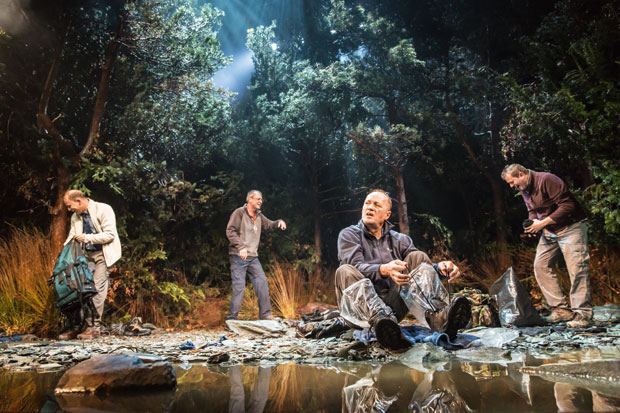Start with a joke. Neville’s Island. Get it? Laughing yet? Are your ribs splitting into pieces? It’s a cracker, isn’t it? Well it’s a pun, at least, on Devil’s Island.
Tim Firth’s play, regarded as a modern classic, premiered 22 years ago in Scarborough: Ayckbourn country, and it shows. Four corporate numbskulls on a team-building exercise get stranded on a remote islet with no hope of rescue. Their Alcatraz is located in the Lake District, which is known to millions as a dead-safe holiday habitat, and this seems to have unsettled Firth so he crams in extra snags to convince us the castaways’ predicament is genuine. Their skiff has capsized. Killer pike throng the lake-waters. Food supplies are limited to a sausage. The only available telephone is on its deathbed. The chaps face a stark choice: co-operation or expiry.
Firth builds his characters from an assembly-line of masculine negatives. Ade Edmondson leads the cast as an interfering know-all with a gloaty aside for every problem. Robert Webb plays a bird-watching Jesus-freak. Miles Jupp gives his version of an Ayckbourn staple: the sexually inert fusspot obsessed with gadgetry. Neil Morrissey fills in the gaps as a minor-chord peace-maker. All four actors are on excellent form, charming, lively and committed to a production which is as good as the flimsy material allows.
Robin Innes Hopkins’s throbbing, humming, dripping set is a character in its own right. A heaving phalanx of Amazonian greenery menaces the stage. Rheumy boughs soar upwards. Swarms of glossy leaves dangle in mid-air. A blue-grey mist prickles the lighting gaffs. Down below the actors walk ankle-deep through sodden mulch. It’s impressive to look at, like one of Blake’s crazy abstract backgrounds, but it’s dramatically redundant because you don’t need half a Kew’s worth of squelchy flora to suggest isolation. Beckett managed it with a broken tree-stump.
Aside from the hard-to-credit situation and the irksome characters, the play is marred by age. The absence of female figures places it firmly in the decade of Men Behaving Badly, when women were regarded as exotic excrescences, prattling and nagging at the edges of mankind’s key drama: male friendship. The arrival of Friends established gender balance as the norm for comedies so this show feels lop-sided, immature and detached from today’s concerns. I heard a fair amount of laughter, I should add, but my sides remained untickled.
Spine, by Clara Brennan, is a monologue starring a cocky, obstreperous Londoner named Amy who guides us through her teenage woes. She’s fallen in love with a misogynistic halfwit, ten years her senior, whose sole attraction is his driving licence. In bed, he celebrates completion by bellowing ‘this pussy is mine!’ into Amy’s hairdo. Afterwards he carries his loaded condom to the pedal bin as if bearing a cargo as precious as the Ebola cure. He’s also a thief and a coward who forces Amy to conduct ‘ninja burglaries’ at night. Her reward for these crimes is to hear further misinformation about the ownership of her vagina.
Nastier stuff follows. Unfairly sacked from her hairdressing job, she vandalises the salon by chucking glass phials over the marble floor and launching a crystal bowl full of perfumed sweets into a fatal parabola. Her family evict her and she finds refuge with a saintly widow named Glenda whose sprawling home is full of learned tomes. Glenda is a golden-hearted Cockney Marxist with an adorably filthy tongue who sets about rescuing Amy. She urges her to educate herself, to become radical, to suppress the despair and cynicism that allow politicians to ignore electors, and to cultivate her ‘beautiful anger’. That lost-soul Amy should find this inspirational muse half a mile from her home is a little improbable. And the sordid details of Amy’s romantic troubles are overcompensated for by a surprise happy ending.
The play is a bit preachy, too, and its comic material is tailored for women rather than for men. But something else is always at work with an accomplished play: there’s a snaring of the sympathies, a tug at the secret threads of the spirit, and this script has that mysterious and surreptitious power. I was gripped, even though the tribulations of a gobby Willesden teenager wouldn’t normally rank higher than five-thousandth on my list of immediate concerns. I wasn’t alone in loving this spiky, angry, harrowing and often hilarious play. The whoops and cheers at the end seemed to astound the performer, Rosie Wyatt, who gave us a bashful grin and disappeared off stage. She should have popped back. We’d have forced her to endure three encores.







Comments